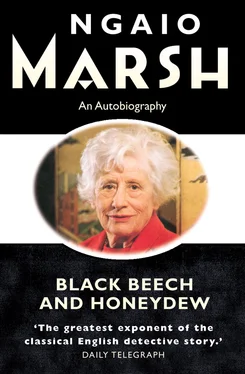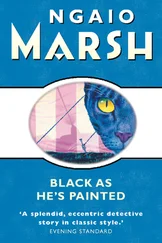Ngaio Marsh - Black Beech and Honeydew
Здесь есть возможность читать онлайн «Ngaio Marsh - Black Beech and Honeydew» — ознакомительный отрывок электронной книги совершенно бесплатно, а после прочтения отрывка купить полную версию. В некоторых случаях можно слушать аудио, скачать через торрент в формате fb2 и присутствует краткое содержание. Жанр: unrecognised, на английском языке. Описание произведения, (предисловие) а так же отзывы посетителей доступны на портале библиотеки ЛибКат.
- Название:Black Beech and Honeydew
- Автор:
- Жанр:
- Год:неизвестен
- ISBN:нет данных
- Рейтинг книги:4 / 5. Голосов: 1
-
Избранное:Добавить в избранное
- Отзывы:
-
Ваша оценка:
- 80
- 1
- 2
- 3
- 4
- 5
Black Beech and Honeydew: краткое содержание, описание и аннотация
Предлагаем к чтению аннотацию, описание, краткое содержание или предисловие (зависит от того, что написал сам автор книги «Black Beech and Honeydew»). Если вы не нашли необходимую информацию о книге — напишите в комментариях, мы постараемся отыскать её.
Black Beech and Honeydew — читать онлайн ознакомительный отрывок
Ниже представлен текст книги, разбитый по страницам. Система сохранения места последней прочитанной страницы, позволяет с удобством читать онлайн бесплатно книгу «Black Beech and Honeydew», без необходимости каждый раз заново искать на чём Вы остановились. Поставьте закладку, и сможете в любой момент перейти на страницу, на которой закончили чтение.
Интервал:
Закладка:
In spite of his anti-religious views my father can have made no objection to my being taken to our parish church or taught to say my prayers. These I found enjoyable. ‘Jesustender. Shepherdhearme.’ ‘Our Fatherchart’ and a monotonous exercise beginning ‘God bless Mummy and Daddy and All Kind Friends and Relations. God bless Gram and Gramp and – ’ It was prolonged for as long as my mother could take it. ‘Susie – and Tip – ’ I would drone, desperate for more objects of beatitude to fend off the moment when I would be left to set out upon the strange journeys of the night. These were formidable and sometimes appalling. There was one uncouth and recurrent dream in which everything Became Too Big. It might start with one’s fingers rubbing gigantically together and with a sickening threepenny piece that swelled horrifically between forefinger and thumb. Then everything swelled to become stifling and I awoke sobbing in my mother’s embrace. With a strangely logical determination, I learned to recognize this nightmare while I was experiencing it and trained my sleeping self to force the strangulated dream-scream that would deliver me.
‘I know,’ my father said. ‘I used to have it. Beastly, isn’t it, but only a dream. One grows out of it.’
My cot with its wooden spindle sides was brought into my parents’ room. In it, on more propitious nights, I sailed and flew immense distances into slowly revolving lights, rainbow chasms and mountainous realms of incomprehensible significance, through which my father’s snores surged and receded. Asleep and yet not asleep, I made these nightly journeys: acquiescent, vulnerable, filled with a kind of wonder.
There were day dreams, too, some of them of comparable terror and wonder, others cosy and familiar. I cannot remember a time when I was not visited occasionally, and always when I least expected it, by an experience which still recurs with, if anything, increasing poignancy. It is a common experience and for all I know there may be a common scientific explanation of it. It comes suddenly with an air of truth so absolute that one feels all other times must be illusion. It is not a sensation but a confrontation with duality. One moves outside oneself and sees oneself as a complete stranger and this is always a shock and an astonishment although one recognizes the moment and can think: ‘Here we go again. This is it.’ It is not self-hypnotism, because there is no loss of awareness as far as everyday surroundings are concerned: only the removal of oneself from the self who observes them and the overwhelming sensation of strangeness. It seems that if one held on to this moment and extended it one would make an enormous discovery but, for me, at least, this is impossible and I always return. Is this, I wonder, what was meant originally by being ‘beside oneself’. It is an odd phenomenon and as a child I grew quite familiar with it.
My grandmother considered that my religious observances were inadequate. When she came to stay with us she brought a Victorian manual which had been the basis of my mother’s and aunts’ and uncles’ dogmatic instruction. It was called Line Upon Line and was in the form of dialogue, like the catechism: Q. and A.
‘“Who,”’ asked my grandmother, beginning at the beginning, ‘“is God?”’
I shook my head.
‘“God,”’ said my grandmother, taking both parts, ‘“is a Spirit.”’
Reminded of the little blue methylated flame on the tea tray I asked: ‘Can you boil a kekkle on Him, Gram?’
She turned without loss of poise to Bible Stories: to Balaam and his ass. I suggested cooperatively that this was probably a circus donkey. My father was enchanted.
My grandmother told my mother that it was perhaps rather too soon to begin religious instruction and, instead, read me the Peter Pan bits out of The Little White Bird.
When I was about twelve my father brought home the collected works of Henry Fielding. ‘Jolly good stuff,’ he said. ‘You’d better read it.’
I began with the plays and was at once nonplussed by many words. ‘What is a “wor"?’ I asked my father who said I knew very well what a war was and mentioned South Africa. ‘This is spelt differently,’ I said, nettled. ‘It seems to be some sort of girl.’ My father quickly said it was a ‘fast’ sort of girl. This was good enough. I had heard girls stigmatized as being ‘fast’ and certainly these ladies of Fielding’s seemed to behave with a certain incomprehensible alacrity. My father suggested that I try Tom Jones. I did so: I read it all and also, since Smollett turned up at this juncture, Roderick Random. It bothered me that I could not greatly enjoy these works since David Copperfield, whom I adored, had at my age or earlier, relished them extremely. I, on the contrary, still doted upon Little Lord Fauntleroy.
We were, as I now realize, hard up. On both sides I came from what Rose Macaulay called ‘have-not’ families. My father was the eldest of ten. When he was still a schoolboy his own father (the youngest of three) died, leaving his widow in what were called reduced circumstances. He was a tea broker in the days of the clippers. This was considered OK socially for a younger son but then ‘an upstart called Thomas Lipton’ came along with his common retail packets and instead of following suit like a sensible man and going into ‘trade’ my grandfather remained genteelly aloof and his affairs went into a decline. His elder brother, William, was in the Colonial Service and became a Vice Admiral and Administrator of Hong Kong. Upon him, a childless man, the hopes of my grandmother depended.
Having begun in a prep school at Harrow and been destined, I suppose, for the public school, my father declined, with the family fortune, upon a number of private establishments but finally was sent to Dulwich College. He used to tell me how it was founded in Elizabethan times by a wonderful actor called Alleyn. The name stuck in my memory. My grandmother had inherited a small Georgian house near Epping and there she coped vaguely with her turbulent sons and three docile daughters with whose French governess one of my great-uncles soon eloped. This was Uncle Julius, a ‘wag’ as his contemporaries would have said and an original: much admired by his nephews, especially by my father. His wife had a markedly Gallic disposition, according to her legend, and unfortunately went mad in later life and used to send flamboyant Christmas cards to my father addressed to H. E. Marsh Esq., General Manager, The Bank of New Zealand, New Zealand. This, as will appear, was a gross overstatement. My father, who had a deep and passionate love of field sports, used to poach with his Uncle Julius on the game preserves of his more richly possessed second cousin. I still have the airgun he bought for this purpose. It is made to resemble a walking-stick. Perhaps his propensity for firearms led him into joining the Volunteers who preceded the New Zealand Army. Before he married he had already received a commission from Queen Victoria in which he was referred to as her ‘trusty and well-beloved Henry Edmund’. He continued with his martial activities until the Volunteers dissolved into a less picturesque organization. I used to think he looked perfectly splendid in his uniform.
The family is supposed to derive from the reprobate de Mariscos of Lundy. Whether this is really so or not, the legend is firmly implanted in all our bosoms. When, as a girl, I read of Geoffrey de Marisco who had the effrontery to stab a priest in the presence of the King, I asked myself if my father’s anticlerical bias was perhaps hereditary. By the reign of Charles II we are on firm historical ground for there is Richard Stephen Marsh, an Esquire of the Bedchamber, a direct forebear and almost the only really interesting character, apart from the de Mariscos, that the family has thrown up. He concerned himself with the trials and misfortunes of Fox, the Quaker, and actually persuaded the King so far out of his chronic lethargy as to intercede very mercifully between Fox and his savage persecutors. It is a curious and all too scantily documented affair. Apparently not only Esquire Marsh, as he is invariably called, but Charles himself responded to the extraordinary personality of this intractable Quaker. Although Marsh died an Anglican and an incumbent of the Tower (or should it be ‘Constable’) there seems to have been some sort of Foxian hangover because his descendants became Quakers and remained so until my great-great-grandfather married out of the Society of Friends and returned to the Church of England. My father was never rude about the Society of Friends.
Читать дальшеИнтервал:
Закладка:
Похожие книги на «Black Beech and Honeydew»
Представляем Вашему вниманию похожие книги на «Black Beech and Honeydew» списком для выбора. Мы отобрали схожую по названию и смыслу литературу в надежде предоставить читателям больше вариантов отыскать новые, интересные, ещё непрочитанные произведения.
Обсуждение, отзывы о книге «Black Beech and Honeydew» и просто собственные мнения читателей. Оставьте ваши комментарии, напишите, что Вы думаете о произведении, его смысле или главных героях. Укажите что конкретно понравилось, а что нет, и почему Вы так считаете.










